The Daily Bulletin is published by Internal and Leadership Communications, part of University Communications
Contact us at bulletin@uwaterloo.ca
Submission guidelines
Editor:
Brandon Sweet
University Communications
bulletin@uwaterloo.ca
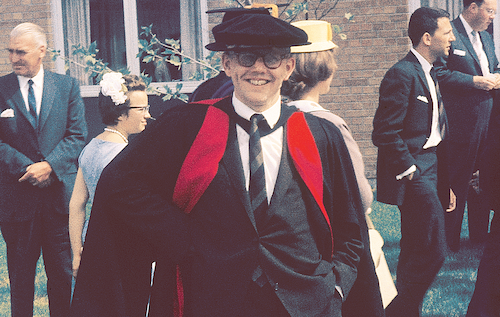
Douglas Tyndall Wright, the University of Waterloo’s third president and vice-chancellor, as well as its founding dean of engineering has died. He was 92.
Wright was Waterloo’s president and vice-chancellor from 1981 to 1993. During his tenure, he moved the University into a whole new level of applied knowledge, patents and technology transfer. Major computer companies saw the advantage of supporting the University by providing equipment and research dollars. For example, Digital Equipment’s $24 million donation bought eight new VAX machines that made it possible to computerize both the Oxford English Dictionary and develop the software, leading to the creation of Waterloo spinoff successes MapleSoft and OpenText.
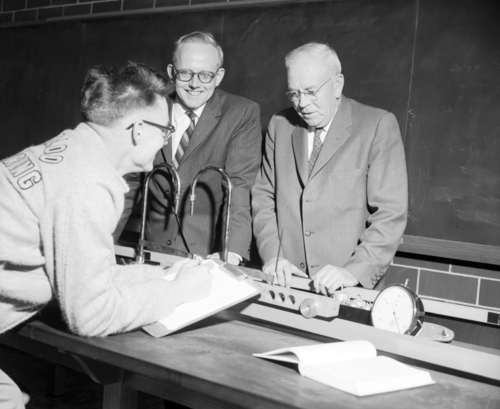
Dean of Engineering Douglas Wright with Engineering student Kurt Szameitait and President of the Engineering Institute of Canada J.J. Hanna at the opening of the Physics and Mathematics Building in October 1959.
He left a teaching position at Queen’s University to join a young upstart University of Waterloo in 1958 as the first chair of civil engineering. He soon became the first dean of engineering. While he was dean, Waterloo became the largest undergraduate engineering school in the country. After returning from an educational conference of the Engineering Institute of Canada, Wright noted what he referred to as inertia at other institutions, which showed an unwillingness to change their customs and curriculum. The Faculty introduced its own curriculum based on co-operative education. He removed courses that seemed less relevant to what was happening in industry. The Engineering 1 building that bears his name was UWaterloo’s first academic building.
Wright left the University for a post at Queen’s Park. He became a deputy minister in 1967 with responsibilities initially for university financing, and subsequently, for social policy with the Cabinet Committee for Social Development. In 1969, in response to concern about the mounting provincial costs for university education, the Honourable William Davis, then minister of education, put Wright in charge of the province’s Committee on University Affairs. Wright chaired the Commission on Post-Secondary Education in Ontario. From 1979 to 1980, he was deputy minister of culture and recreation.
He came back the University as president, and would lead it for nearly 12 years, throughout the 1980s and early part of the 1990s.
“His return to Waterloo as our third president signalled a return to the no- holds-barred restlessness and momentum of the founding years. Limiting precedents and policies may have been put in place, but more significantly, Doug Wright was primarily interested in challenges to be pursued,” said Ken McLaughlin, historian and author. “He had a relentless curiosity compounded by a drive for relevance in university life and practice, along with a sense that in Canada we needed to change the university landscape. He pushed, prodded and pulled us with him as he pursued academic excellence and social relevance.”
Waterloo celebrated its 25th anniversary in 1982. On March 17 of that year, the University launched two major initiatives: the Watfund fund-raising campaign and the Institute for Computer Research. When Watfund was launched, it had a goal of $21 million, but it had already brought in $8 million. In December of that year, partnerships between Waterloo and IBM Canada worth $17 million included software, hardware, employment and research. The IBM deal was the largest gift ever received by the University at that time.
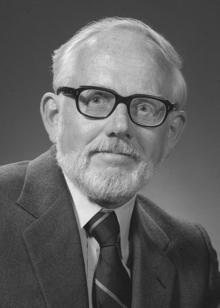 “Doug Wright was one of the most important influences on the establishment of two of the principal characteristics of who we are at Waterloo: Co-op and the value of experiential learning, and the principles of entrepreneurship, risk-taking and individual initiative,” said Rick Haldenby, a professor in Waterloo’s School of Architecture, and who first met Wright in 1969. “His guiding of the overall development of the infrastructure of post-secondary education in the 1960s and ‘70s is absolutely vital. Anyone going to university in Ontario today is part of the legacy of Doug Wright.”
“Doug Wright was one of the most important influences on the establishment of two of the principal characteristics of who we are at Waterloo: Co-op and the value of experiential learning, and the principles of entrepreneurship, risk-taking and individual initiative,” said Rick Haldenby, a professor in Waterloo’s School of Architecture, and who first met Wright in 1969. “His guiding of the overall development of the infrastructure of post-secondary education in the 1960s and ‘70s is absolutely vital. Anyone going to university in Ontario today is part of the legacy of Doug Wright.”
In May of 1984, construction began on what would become known as the William G. Davis Centre for Computer Research. This Ontario government’s green light for the project was no small win for the University or Wright because at the time there was a moratorium of new university buildings.
After leaving the University, Wright continued to be involved in engineering, with service on a member of technical committees, and as an advisor on what would later become known as the Rogers Centre in Toronto. When it was new, the stadium then known as SkyDome was the first such sports facility to have a fully retractable roof, of which Wright was very proud.
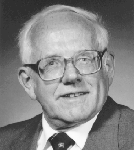 Wright advised the Government of Ontario and the Government of Canada. He served as director of a number of corporations (COM-DEV, Electrohome, Meloche Monnex Inc., Research in Motion, Gseken Group Corporation). In 1992 he was appointed Chairman of the Canadian Working Group of the Trilateral Task Force on North American Co-operation in Higher Education and Research. He remained an adjunct professor in the Faculty of Engineering of the University of Waterloo.
Wright advised the Government of Ontario and the Government of Canada. He served as director of a number of corporations (COM-DEV, Electrohome, Meloche Monnex Inc., Research in Motion, Gseken Group Corporation). In 1992 he was appointed Chairman of the Canadian Working Group of the Trilateral Task Force on North American Co-operation in Higher Education and Research. He remained an adjunct professor in the Faculty of Engineering of the University of Waterloo.
“On behalf of the University of Waterloo community, I would like to extend our deepest condolences to the Wright family,” says Feridun Hamdullahpur, president & vice-chancellor, “We lost a tremendous researcher, leader and Canadian. I will certainly miss his guidance and friendship. There is no doubt that Waterloo would not be the same without his leadership during a formative time in our institution’s history. All of Canada is better for having Douglas Wright as a part of it.”
Wright was born in Toronto in 1927. He studied civil engineering at the Universities of Toronto, Illinois and Cambridge where he received a PhD. He was a Fellow of the Canadian Academy of Engineering, an Officer of the Order of Canada, and in 1993 was appointed Chevalier dans L'Ordre National du Mérite de France. He loved art and design, sailing, and had an insatiable curiosity and interest in learning. At the time of his death, he had 88 books on hold at his local branch of the Toronto Public Library.
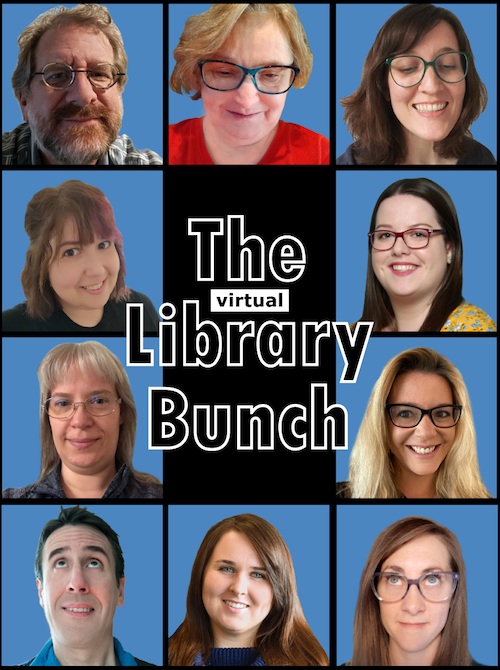
By Mary Lynne Bartlett (pictured left, second row). This is part of an ongoing series in the Daily Bulletin and on the Library website.
"They're better than Santa Claus, they're library staff!" — adapted from Cindy Brady.
The first two installments of The Virtual Library Bunch explored how staff have been working to adapt front-facing services and resources. Episode three, "Dear Library" looks behind-the-scenes in some of the other units across the Library. Staff have continued full force while working from home.
Dedicated staff are ensuring information and research is accessible when you need it. Special Collections & Archives (SCA) is one of the smaller units within the Library, but it has a big impact, allowing users to research and reflect on unique material from the past. Danielle Robichaud, digital archivist (pictured right, top row), is very passionate about her work. Responsible for managing the digitization of collections in SCA, Danielle makes them available online for researchers. One of the biggest challenges facing the unit during the pandemic is not having access to the physical holdings, while still virtually providing reference and instructional support. As Danielle points out, "we can never replicate online what it's like for someone to see, hold, hear or smell a one-of-a-kind item from another time period in person." Fortunately, SCA was already actively making holdings more accessible to users virtually. The Archives Database was launched in 2019, which is a web-based descriptive platform that provides information about collection holdings, allowing researchers and staff to locate records using keyword searches or browsing by thematic area. Researchers can also browse a selection of digitized items online via the Waterloo Digital Library, thus you can still make use of SCA holdings despite being unable to visit in person. If you can't find what you need, never fear — SCA staff are ready and able to make alternate suggestions that can help you accomplish your research goals from home. You can read more about what Danielle and her colleagues are up to by checking out SCA's blog that highlights what it's like to work with rare and unique collections. Many treasures can be found in SCA, including the staff working to provide innovative ways of accessing it, just like Danielle.
Cataloguers are another group of library staff that ensure we have accurate and reliable access to resources. Updating records and cataloguing online resources has been happening for some time, so working from home was an extension of the daily work that happens in the physical library building. Cataloguers are also providing reference services through chat, instead of at the Assignment and Research Help desk. Susan Lancsak, cataloguing and metadata librarian (pictured centre, top row), shared her insights on the impact of working from home and how her unit has adapted quickly to ensure continued access to needed resources. Cataloguing staff were able to transition quickly to the virtual environment because much of their work can be done online. Staff provide effective record descriptions and proper subject analysis to facilitate accurate and effective discovery of materials. The Library recently implemented a new academic search tool, Omni. The staff side of this search tool, called Alma, is where cataloguers make the discovery of unique material possible, such as rare books and University of Waterloo theses. Omni reflects the holdings of our Library and facilitates access to not only our repositories and databases, but that of 14 other institutions across the province. As Susan points out "our Library is a gateway to knowledge." Library’s cataloguers are keeping that gateway open for us, through their continued hard work.
Whether archivists are documenting the COVID-19 experience for future researchers, or cataloguers are ensuring Omni is working properly, one thing is for sure, library staff are committed to making resources and services the best for you! Next week in our final episode, "the show must go on?," we interview staff who joined The Virtual Library Bunch during the pandemic. Find out what their experience has been like onboarding virtually and how they are getting situated.
"As your representatives, the University of Waterloo Staff Association continues to advocate your needs to UW Administration," says a note from the UWSA. "To better guide these discussions, we would like you to answer this short COVID Campus Climate Survey, so we can gather the issues that are important to you. We also want to gauge how well you are doing, now that some are working from home and others are working at what is undoubtedly a very different campus from just a couple of months ago. We will continue to survey you during this pandemic so we can provide feedback to UW Administration with insights into how the measures they take impact you, as employees."
The University’s benefits provider, Canada Life (formerly Great-West Life) is offering several free webinars and tools to help support plan members during the pandemic.
“There's a need for financial- and mental-health resources that support members during these changing times,” says the note from Canada Life. “That's why Canada Life is offering Resources to support your well-being. These free and informative webinars are open to any plan members with Canada Life. They'll be hosted by Canada Life in partnership with the Credit Counselling Society and Workplace Strategies for Mental Health.”
The webinars will be offered as Microsoft Teams Live events. Presentations will take up to an hour and attendees will be able to submit questions through the Q&A feature.
The webinars are scheduled as follows:

“This little guy was in our neighbour’s yard this morning,” writes Sarah Forgrave, web and communications officer in the Faculty of Science. “See the dandelion for size reference! About two days old.”

"I thought I would share our newest member to our family, Covie!" writes Eric Mah, web and media coordinator in the School of Accounting and Finance. "He is a pure bred Maine Coon and is only 12 weeks old. We decided to name him Covie so we have something positive to think back on during this COVID-19 pandemic."
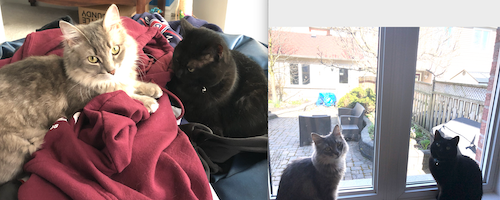
"Here are two pictures of my cats Emmett (grey) and Smokey (black)" writes Sharon Kimberley of CEE Services in Co-operative and Experiential Education. "In the first picture, they are providing home-schooling supervision for my teenaged daughter. Second picture, they are having a deep discussion about the various initiatives we here in CEE Services are undertaking to help UW’s move to on-line service delivery."

“It’s hard to resist a rub of Darwin’s soft, fluffy belly when he throws himself at your feet like this," writes Professor Denise Marigold, chair of Social Development Studies at Renison University College. "But beware – when he’s had enough, you’ll be informed with a sudden attack on your arm!”
International Missing Children's Day
Students can visit the Student Success Office online for supports including academic development, international student resources, leadership development, exchange and study abroad, and opportunities to get involved.
Award from GSEF-GSA-GSPA for thesis-based master’s and PhD students who have lost funding because of COVID-19. Visit https://uwaterloo.ca/gspa/covid-19-updates-graduate-students for more details.
Instructors can visit the Keep Learning website to get support on adapting their teaching and learning plans for an online environment. The following workshops are current offerings from the KL team (CTE, CEL, ITMS, LIB):
ATLAS: Part 1, Monday, May 25, 1:00 p.m.
Using the Grades Tool in LEARN, Tuesday, May 26, 10:00 a.m.
Akindi Training Session, Tuesday, May 26, 1:00 p.m.
ATLAS: Part 2, Wednesday, May 27, 1:00 p.m.
Open Educational Resources (OER) Workshop: Copyright, Licensing, Searching, and Selection, Tuesday, May 26, 1:00 p.m.
Remote Course Design Essentials, Wednesday, June 3.
Using the Grades Tool in Learn, Wednesday, June 3, 1:00 p.m.
Employees can access resources to help them work remotely, including managing University records and privacy of personal information
Here are some tips for staying healthy while working from home:
The Writing and Communication Centre has gone virtual to provide assistance.
Grad Writing Cafés and #WaterlooWrites, self-registration on LEARN:
Virtual Drop-In Appointments, Tuesday, May 19 to Thursday, August 6, registration on WCONLINE
We understand that these circumstances can be troubling, and you may need to speak with someone for emotional support. Good2Talk is a post-secondary student helpline based in Ontario, Canada that is available to all students.
If you feel overwhelmed or anxious and need to talk to somebody, please contact the University’s Campus Wellness services, either Health Services or Counselling Services.
The Library has published a resource guide on how to avoid information overload.
The Faculty Association of the University of Waterloo (FAUW) continues to advocate for its members. Check out the FAUW blog for more information.
The University of Waterloo Staff Association (UWSA) continues to advocate for its members. Check out the UWSA blog for more information.
WUSA supports for students:
Food Support Service food hampers are currently available from the Turnkey Desk on weekdays from 9:00 a.m. to 4:00 p.m. in the Student Life Centre. If you have any questions please email us at foodsupport@wusa.ca.
MATES – Providing general online Peer Support via Skype to undergraduate students. To set up an appointment, please contact mates@wusa.ca
Empower Me is a confidential mental health and wellness service that connects students with qualified counsellors 24/7. They can be reached at 1-844-741-6389.
Glow Centre - Providing online Peer Support for the LGBTQ2+ community via Skype to Undergraduate students. To set up an appointment, please contact glow@wusa.ca
The Women’s Centre – Providing online Peer Support via Skype to undergraduate students. To set up an appointment, please contact womenscentre@wusa.ca
RAISE – Providing online Peer Support via Skype to undergraduate students. To set up an appointment, please contact raise@wusa.ca.
Centre for Academic Policy Support - CAPS is here to assist Waterloo undergraduates throughout their experience in navigating academic policy in the instances of filing petitions, grievances and appeals. Please contact them at caps@wusa.ca . More information at http://wusa.ca/caps
WUSA Commissioners who can help in a variety of areas that students may be experiencing during this time:
WUSA Student Legal Protection Program - Seeking legal counsel can be intimidating, especially if it’s your first time facing a legal issue. The legal assistance helpline provides quick access to legal advice in any area of law, including criminal. Just call 1-833-202-4571.
Please note: The University has suspended all in-person events until further notice. Please contact the event organizers to confirm whether the event has shifted to an online mode of delivery.
Organizing a virtual event? Send an email to bulletin@uwaterloo.ca to have it featured in Where and When.
The Workplace Yoga Program is live-streaming classes on Tuesdays and Wednesdays from 12:05 p.m. to 12:50 p.m. in April and May.
Problem Lab pitch competition applications open, May 11 to June 7.
Akindi Live Training (Webinar), Tuesday, May 26, 1:00 p.m. to 2:00 p.m.
The Post-COVID-19 Reboot, “Rebooting: Supply Chain Considerations” (panel session 2 of 6) Wednesday, May 27, 1:00 p.m.
Concept Intro Session: Building Your Business during a Pandemic, Wednesday, May 27, 6:30 p.m.
International Student Online Discussion, Filing your taxes in Canada, Thursday, May 28, 9:00 a.m., online.
Science Innovation Hub Guest Lecture: Scientific Innovation and Entrepreneurship with Prof. Joseph Bondy-Denomy, Thursday, May 28, 2:00 p.m.
Warrior Rec Esports Registration now open until May 29. Eight leagues available (FIFA20, NHL20, NBA2K20, Madden20 for Playstation 4 or XboxOne). Only $5/entry.
Waterloo's Human-Computer Interaction labs (UWHCI) Present: WatCHI, a livestream event highlighting our contributions to HCI this year, Tuesday, May 29, 9:00 a.m. to 3:30 p.m. Visit watchi.live for schedule and stream info.
The Post-COVID-19 Reboot, “Rebooting: Security and data privacy considerations” (panel session 3 of 6), Tuesday, June 2, 1:00 p.m.
NEW – Human Rights, Equity and Inclusion Seminar, Equity 101, Wednesday, June 3, 9:00 a.m. to 12:00 p.m.
Q&A with the Science Innovation Hub Advisory Team, Wednesday June 3, 10:00 a.m.
NEW – Concept Intro Session: The Model Business, Wednesday, June 3, 6:30 p.m.
More Feet on the Ground Mental Health Training for Students, Thursday, June 4, 9:30 a.m., Microsoft Teams – Register on GoSignMeUp.
NEW - Concept $5K Applications Open, Monday, June 8.
NEW – Human Rights, Equity and Inclusion seminar, Policy 42 & You, Lunch and Learn on Policy 42: the Sexual Violence Prevention and Response Policy and Procedures, Tuesday, June 9, 12:00 noon to 1:00 p.m.
NEW - Science Innovation Hub Skills Development Workshop: Understanding a Paper, Wednesday June 10, 3:00 p.m. .
NEW - Conrad School of Business and Entrepreneurship presents “Meet the MBETs Information Sessions – Part-time MBETs,” Wednesday, June 10, 6:00 p.m. to 7:00 p.m.
NEW – Concept Intro Session: Validation Exploration, June 10, 6:30 p.m.
NEW – Human Rights, Equity and Inclusion seminar, Managing Difficult Conversations, Thursday, June 11, 9:00 a.m. to 12 noon.
NEW - The Post-COVID-19 Reboot, “Rebooting with Research: Tackling real-world problems” (panel session 4 of 6) Thursday, June 11, 1:00 p.m.
The Daily Bulletin is published by Internal and Leadership Communications, part of University Communications
Contact us at bulletin@uwaterloo.ca
Submission guidelines
The University of Waterloo acknowledges that much of our work takes place on the traditional territory of the Neutral, Anishinaabeg, and Haudenosaunee peoples. Our main campus is situated on the Haldimand Tract, the land granted to the Six Nations that includes six miles on each side of the Grand River. Our active work toward reconciliation takes place across our campuses through research, learning, teaching, and community building, and is co-ordinated within the Office of Indigenous Relations.